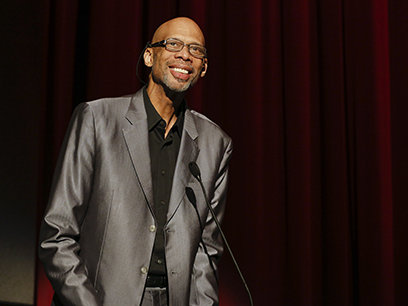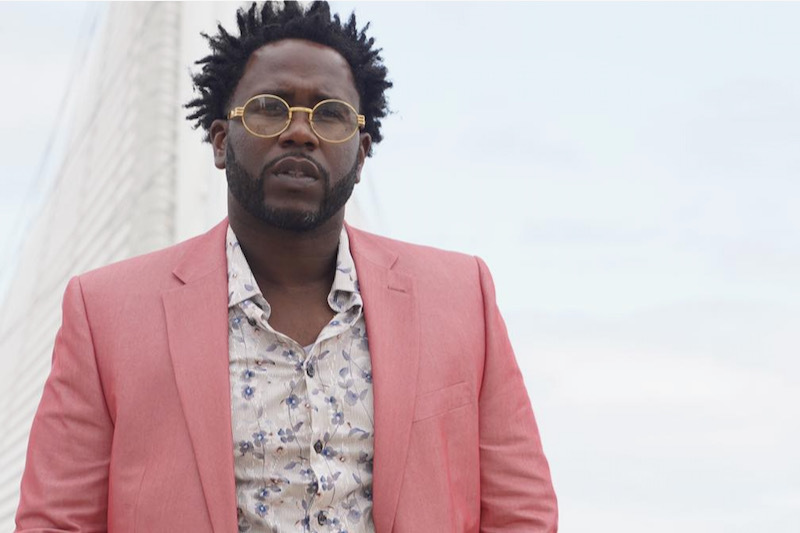OnMilwaukee is honored to sponsor "Becoming Kareem Live On-Stage" at the Marcus Center for the Performing Arts on Friday, Sept. 7. Based on the best-selling book by the same name, this speaking tour featuring Kareem Abdul-Jabbar opens in Milwaukee with a new multimedia experience.
The "Becoming Kareem" Live Tour is being managed by American Program Bureau and is presented by Iconomy. Friday performance is sponsored by the Greater Milwaukee Foundation, Herb Kohl Philanthropies, Hallman Lindsay Quality Painters, Laughlin Constable, Visit Milwaukee, Saz’s Hospitality Group, BizTimes Media, ZYN, OnMilwaukee and Steinhafels.
The event will feature a one-on-one candid discussion about Kareem Abdul-Jabbar’s storied basketball career and his reflections on the people and places that impacted his view of life. Bill Michaels will interview Kareem, who was drafted No. 1 by the Milwaukee Bucks in 1969. He led the Bucks to their only NBA title in 1971.
Before Friday’s event, we asked the NBA’s all time leading scorer and modern Renaissance man several questions on a variety of topics, via email.
Enjoy this very special "Milwaukee Talks" with Kareem Abdul-Jabbar.
OnMilwaukee: What does Milwaukee mean to you?
Kareem Abdul-Jabbar: Milwaukee is where I both flourished as a pro and matured as a man. The Bucks were a young team, only two years old, when I joined them, but we soon became a dominant team in the NBA. This was due to the great team effort, but also because we had such an enthusiastic and supportive fan base. That made playing here and living here all the more fulfilling and enjoyable.
Did you know there’s a Kareem emoji?
I know there’s a Ramadan Kareem emoji that isn’t related to me personally. But I don’t know of an emoji that looks like me.
Which one of your books are you proudest of and why?
Two books have brought me the most personal satisfaction: "What Color Is My World? The Lost History of African American Inventors" is a children’s book that I wrote to promote black history as well as to inspire children of color to imagine themselves in the sciences. When that book was published, I visited many elementary and middle schools and had children running up to me saying, "I never thought I could be an inventor, but now I do." I felt like that book opened some children to new possibilities about their future.
I also am proud of "Becoming Kareem: Growing Up On and Off the Court" because it’s such a candid and in-depth look at my struggles growing up that I hope it helps other kids who are struggling to find their true selves.
What are you most proud of, social progress-wise, within the NBA?
Seeing players unite to protest injustices makes me proud as an athlete, as a former NBA player and as an African-American. Teamwork doesn’t have to end when you step off the court. It’s teamwork that wins championships, but it’s also teamwork that changes the country for the better.
I was especially impressed when the NBA boycotted North Carolina as host of the All-Star Game for their anti-LGBTQ policies in passing HB2. Unfortunately, the faux repeal of HB2, which still allows for discrimination, convinced the NBA to do business with North Carolina again. Which is why players have to be eternally vigilant if they want any social progress they fight for to stick around for longer than a single protest.
From a health and wellness standpoint, much has changed since your playing days. How do you keep up with trends and health eating today?
I don’t really follow the wellness trends for athletes since it doesn’t really apply to me anymore. When I played, I always ate healthy and well-balanced meals. And I maintained a good balance between my physical and mental health by practicing martial arts and yoga. I keep physically fit today with a lot of walking, stretching and moderate eating. I keep my mind sharp by reading a lot. Exposing myself to new ideas keeps the brain young.
Related, what’s a typical breakfast for you?
Eggs, turkey bacon, English muffin, yogurt and berries.
A 10-year-old thinks he’s destined for the NBA: What’s your advice for him or her?
Practice hard and study hard. Kids should dream big, but we do a disservice to them if we don’t prepare them for more than just one dream. The odds of a high school player being drafted into the NBA is about 3 in 10,000. Even if they make it, the average number of years playing is 4.8. That leaves a lot of life to live in which you aren’t playing ball. The best thing I did was take my studies seriously because it made for a much richer more interesting life while I played and after I retired.
What other tips and advice do you have for kids, especially shy/introverts as you’ve said you were an introvert.
One thing a shy kid knows is that they will never follow the advice they get for how to get over being shy. You don’t "get over" shyness; you just learn to cope. I can suggest that if you’re shy like I was, try to be patient with people who are trying to pull you out of your shell. They mean well. Also, accept invitations to events that you might be afraid to attend because you don’t know people. You always have the option to keep to yourself at these events, but you also have the possibility of meeting new people and just enjoying the event itself. Baby steps.
What are reading now?
I’m reading some excellent mysteries right now. Joe Ide’s "Righteous" features a young black man with Sherlock Holmes-like abilities. Walter Mosley’s "Down the River Unto the Sea" delivers once again with this detective novel about disgraced former NYPD cop Joe King Oliver, a good man and good father dragged into an evil world.
Milwaukee, like many cities, has its opportunities and challenges with race and difference. How can we tackle Islamophobia, and how has it changed in today’s turbo charged political world?
We can’t tackle Islamophobia unless we’re tackling all forms of bias at the same time. Otherwise, it’s like squeezing a balloon: You press down one side and it swells up elsewhere. All marginalized groups have to work together to fight prejudice on both the political front – by passing laws – and the social front – by making society aware of the disparity. Because the Trump Administration has been so open in their policies to discriminate against minorities, women, religions, etc., some groups in America have felt emboldened to step-up their hate speech. Right now, we have to get out and vote during the midterm elections to put people into office who will not tolerate such anti-American behavior or policies. One positive result of the Administration’s persecution of Muslims is that more Muslims than ever are running for public office.
You are a global, household name and have had the fortune of traveling the world. What are the similarities you see, and how can we connect cultures for the betterment of humanity?
What connects cultures and religions is a commitment to try to be good people, good parents, good neighbors. Most people want to do the right thing, the kind thing, the compassionate thing – they just disagree on what that means and how to do it. Of course, there are plenty of selfish jerks in every culture who just want to exploit everyone around them in order to enrich themselves. These people often pretend to be deeply religious or patriotic when they are the opposite. The elimination of despotic governments will help bring cultures closer because there will be more of an emphasis on education rather than brainwashing. When that happens, people will not treat each other with fear because they will begin to recognize themselves in others.
If you could have dinner with one person you’ve never met, who would it be and why?
Sir Arthur Conan Doyle, the creator of Sherlock Holmes. Not only do I appreciate his literary accomplishments, which include comic stories and science fiction, but for his wide and varied interests. He was a physician who strongly advocated for vaccinations. He was also an accomplished athlete, playing soccer, cricket, golf, as well as being an amateur boxer. And although we would have political difference, I appreciate that he was a staunch proponent for social justice. He actually investigated two cold cases that resulted in both men being exonerated. That would be one great dinner.
Post basketball, what’s been your most rewarding role? Most challenging?
I don’t really think of my life being divided into separate roles. I’m a writer, I’m and activist, I have a camp for children. These are manifestations of the same impulse in me to be an active force in making America the land of equal opportunity the Constitution wants it to be. Sometimes that means writing articles or books, sometimes it means visiting schools to promote STEM programs, sometimes it means commenting on pop culture. All of it is rewarding because all of it nudges the country a tiny bit in the right direction.
Define success.
What I like about success is that it can be a fluid thing that changes as you mature and gain more perspective on yourself and the world. At first, success can mean setting a goal and achieving it. But then as you grow older, you start to question what those goals should be. Should they be goals that only benefit yourself, that show off how wonderful you are? Or is success establishing goals that are more fulfilling over a lifetime? I think I’m successful, not because of the awards and trophies, but because those things helped me create a platform from which to help others. Success has to bring you a sense of satisfaction; it has to fill you up. If achieving something only makes you hungry for more, that’s not success, it’s an addiction. You’re never full.
A life-long and passionate community leader and Milwaukeean, Jeff Sherman is a co-founder of OnMilwaukee.
He grew up in Wauwatosa and graduated from Marquette University, as a Warrior. He holds an MBA from Cardinal Stritch University, and is the founding president of Young Professionals of Milwaukee (YPM)/Fuel Milwaukee.
Early in his career, Sherman was one of youngest members of the Greater Milwaukee Committee, and currently is involved in numerous civic and community groups - including board positions at The Wisconsin Center District, Wisconsin Club and Marcus Center for the Performing Arts. He's honored to have been named to The Business Journal's "30 under 30" and Milwaukee Magazine's "35 under 35" lists.
He owns a condo in Downtown and lives in greater Milwaukee with his wife Stephanie, his son, Jake, and daughter Pierce. He's a political, music, sports and news junkie and thinks, for what it's worth, that all new movies should be released in theaters, on demand, online and on DVD simultaneously.
He also thinks you should read OnMilwaukee each and every day.




.jpg)


